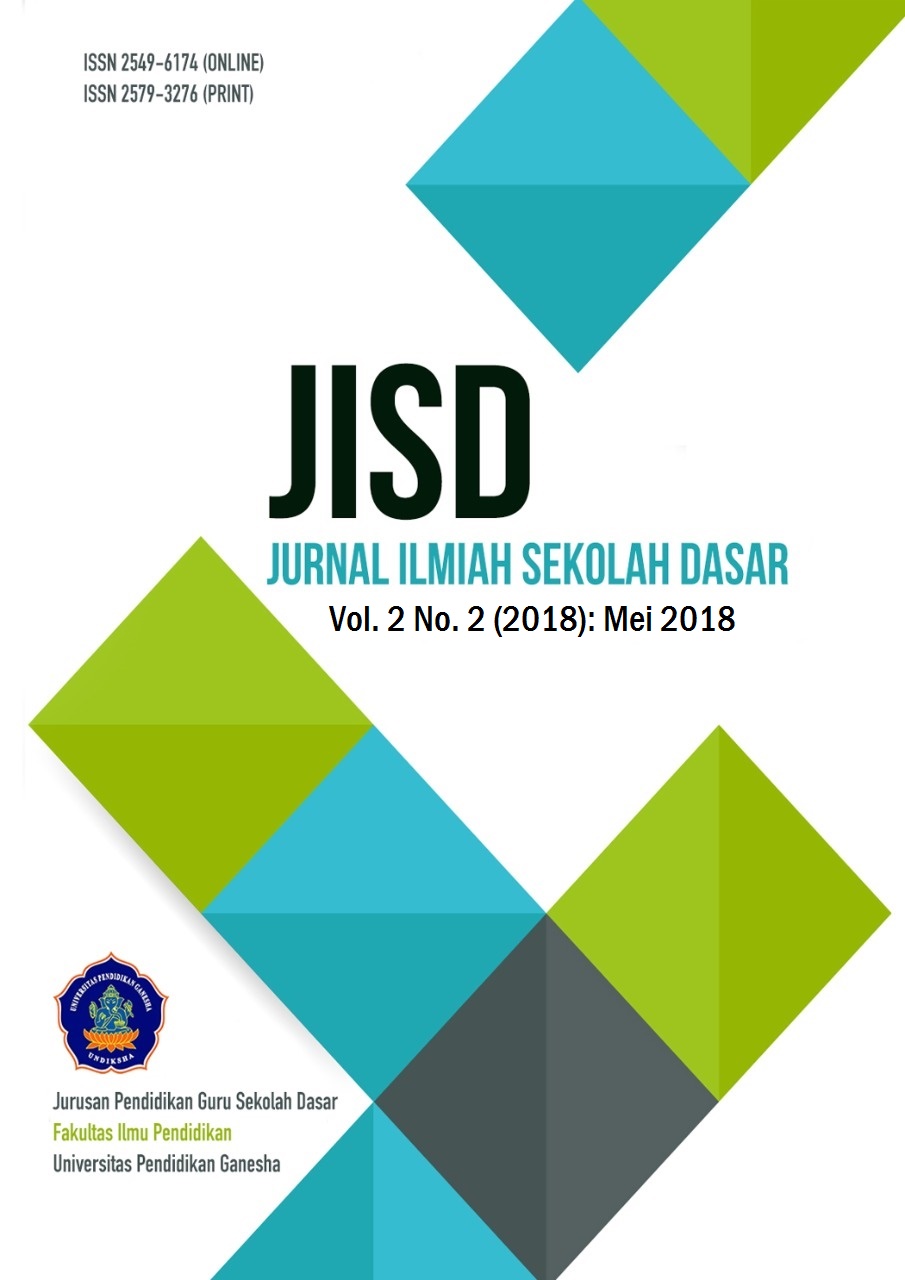Pengaruh Model Pembelajaran Problem Based Learning Berbantuan Audio Visual Terhadap Penguasaan Kompetensi Pengetahuan IPA
DOI:
https://doi.org/10.23887/jisd.v2i2.15494Abstract
This study aims to determine the significant differences in the mastery of science knowledge competence group of students who are taught by the model problem based learning of audio visual media with groups of students who are taught through conventional learning in fourth grade students of SD Dewi Sartika Denpasar Clinic School Year 2016/2017. This research type is quasi experiment research with nonequivalent control group design. The population of this study is all students of grade IV SD Dewi Sartika Denpasar Elementary School, amounting to 374 students. Samples were taken by random sampling technique. The sample in this research is the fourth grader of SDN 3 Kesiman amounting to 40 students as the group which is taught by the model problem based learning assisted by Audio Visual media and the fourth grade students of SDN 17 Kesiman is 40 students as control group with conventional learning. The data were collected using a test method in the form of a standard multiple-choice objective test with four answers. The data obtained were analyzed using t-test analysis. The result of data analysis is obtained tvalue = 6,573> ttable = 2,000 for 5% significance and dk = 78. Based on testing criteria, H0 is rejected and Ha accepted. Based on the results of this study can be concluded that there is the influence of problem based learning modeled audio visual media on the mastery of science knowledge competence of fourth grade students SD Gugus Dewi Sartika Denpasar Academic Year 2016/2017References
Agung, A.A. Gede. 2014. Metodologi Penelitian Pendidikan. Malang: Aditya Publishing.
Arikunto, Suharsimi. 2015. Dasar-dasar Evaluasi Pendidikan. Jakarta: PT Bumi Aksara.
Asyhar, Azhar. 2012. kreatif mengembangkan media pembelajaran. Referensi Jakarta.
Candiasa I Made, 2010. Statistik Multivariat Disertai Aplikasi SPSS, Singaraja: Universitas Pendidikan Ganesha.
Dante, nyoman. 2012. Metode Penelitian. Yogyakarta.
Daryanto.2014.”Pembelajaran Saintifik”. Yogyakarta : Gava Media.
Edwards, S. dan Hummer, M. (2007). Journal Internasional. Problem Baseb Learning in Early Chilhood and Primary Pre-Service Teacher Education: Identifying the Issues and Examining the Benefits. Diunduh pada tanggal 7 Agustus 2018 dari http/:ro.ecu.edu.au/ajte/vol32/iss2/3.
Giarti, S. 2015. Peningkatan Keterampilan Proses Pemecahan Masalah dan Hasil Belajar Matematika Menggunakan Model PBL Terintegrasi Penilaian Autentik Pada Siswa Kelas VI SDN 2 Bengle, Wonosegoro. In Prosiding Seminar Pendidikan Ekonomi dan Bisnis (Vol. 1, No. 1).
Gunantara, Gd. 2014. “Penerapan Model Pembelajaran Problem Based Learning Untuk Meningkatkan Kemampuan Pemecahan Masalah Matematika Siswa Kelas V’. https://ejournal.undiksha.ac.id/index.php/JJPGSD/article/view/2058/1795 (Vol. 2 No. 1).
Kosasih.2015. Strategi Belajar dan Pembelajara.Bandung : Yrama Media.
Koyan, I Wayan. 2007. Statistika Terapan (Teknik Analisis Data Kuantitatif).
Kunandar. 2014. Penilaian Autentik Penilaian Hasil Belajar Peserta Ddidik Berdasarkan Kurikulum 2013. Jakarta: Rajawali Pers.
Maarif, H., & Wahyudi, W. (2015). Eksperimentasi Problem Based Learning dan CIRC dalam Menyelesaikan Soal Cerita Matematika Siswa Kelas 5 SD. Scholaria: Jurnal Pendidikan dan Kebudayaan, 5(2), 97-115.
Oktaviani. 2014. “Pengaruh Model Problem Based Learning Berbasis Asesmen Kinerja Terhadap Hasil Belajar IPA Ditinjau Dari Gaya Kognitif’’. E-Jurnal Program Pasca Sarjana Universitas Pendidikan Ganesha (Volume : 4).
Purnama, Arida. 2016. “Pengaruh Problem Based Learning (PBL) Terhadap Hasil Belajar IPA Siswa Kelas IV SD’’. E-Jurnal PGSD Universitas Pendidikan Ganesha (Volume 4 halaman: 3).
Sani, Ridwan Abdulah. 2015. Pembelajaran Saintifik untuk Inflementasi kurikulum 2013. Jakarta: PT Bumi Aksara
Setyosari, Punaji. 2015. Metode Penelitian Pendidikan Dan Pengembangan. Jakarta: Pranadamedia Group
Sigit Mangun Wardoyo, 2015. Pembelajaran Konstruktivisme. Bandung: Alfabeta.
Sudijono, Anas. 2013. Pengantar Evaluasi Pendidikan. Jakarta: PT Rajagrafindo Persada.
Sugiyono, 2013, Metode Penelitian Kuantitatif Kualitatif dan R & D, Bandung:Alfabeta.
Sugiyono. 2014. Motode Penelitian Administrasi. Bandung : Alfabeta.
Sumantri.2015 .Strategi Pembelajaran. Jakarta: PT Raja Grafindo Persada.
Supriadi, Made. 2012. “Model Pembelajaran Problem Based Learning Berbantuan Media Audiovisual Berpengaruh Terhadap Hasil Belajar IPS Siswa Kelas IV SD Gugus Ubud Gianyar”. E-Jurnal mimbar PGSD Universitas Pendidikan Ganesha (halaman: 4).
Supraptinah, U., Budiyono, B., & Subanti, S. (2015). Eksperimentasi Model Pembelajaran Discovery Learning, Problem Based Learning, Dan Think-Talk-Write Dengan Pendekatan Saintifik Terhadap Kemampuan Pemecahan Masalah Matematika Ditinjau Dari Kemandirian Belajar Siswa. Jurnal Pembelajaran Matematika, 3(10).
Suwandi, Y. (2015). Peningkatan Hasil Belajar IPA Tentang Ekosistem Melalui Metode Problem Based Learning Pada Siswa Kelas V Sekolah Dasar Kabupaten Tana Tidung. Jurnal Pendidikan Dasar Volume 6 Edisis 1 mei 2015, 93 - 102.
Syafriana, D. (2016). Penerapan Model Problem Based Learning (Pbl) Dalam Pendekatan Saintifik Untuk Meningkatkan Hasil. Jurnal Inovasi Pendidikan Dan Pembelajaran Sekolah Dasar, 30 - 43
Samatowa. 2011. “Pembelajaran IPA di Sekolah Dasar”. Jakarta:Indek.
Susanto, Ahmad. 2013. (Teori Belajar & Pembelajaran). Jakarta Prenamedia Group
Wisudawati&Sulistyowati.2014.”Metodologi Pembelajaran IPA”.Jakarta:PT Bumi Aksara.
Wiyani, Novan Ardy. 2013. Desain Pembelajaran Pendidikan: Tata Rancang Pembelajaran Menuju Pencapaian Kompetensi. Yogyakarta: AR-Ruzz Media.
Downloads
Published
How to Cite
Issue
Section
License
Authors who publish with the Journal Ilmiah Sekolah Dasar agree to the following terms:
- Authors retain copyright and grant the journal the right of first publication with the work simultaneously licensed under a Creative Commons Attribution License (CC BY-SA 4.0) that allows others to share the work with an acknowledgment of the work's authorship and initial publication in this journal.
- Authors are able to enter into separate, additional contractual arrangements for the non-exclusive distribution of the journal's published version of the work (e.g., post it to an institutional repository or publish it in a book), with an acknowledgment of its initial publication in this journal.
- Authors are permitted and encouraged to post their work online (e.g., in institutional repositories or on their website) prior to and during the submission process, as it can lead to productive exchanges, as well as earlier and greater citation of published work. (See The Effect of Open Access)










